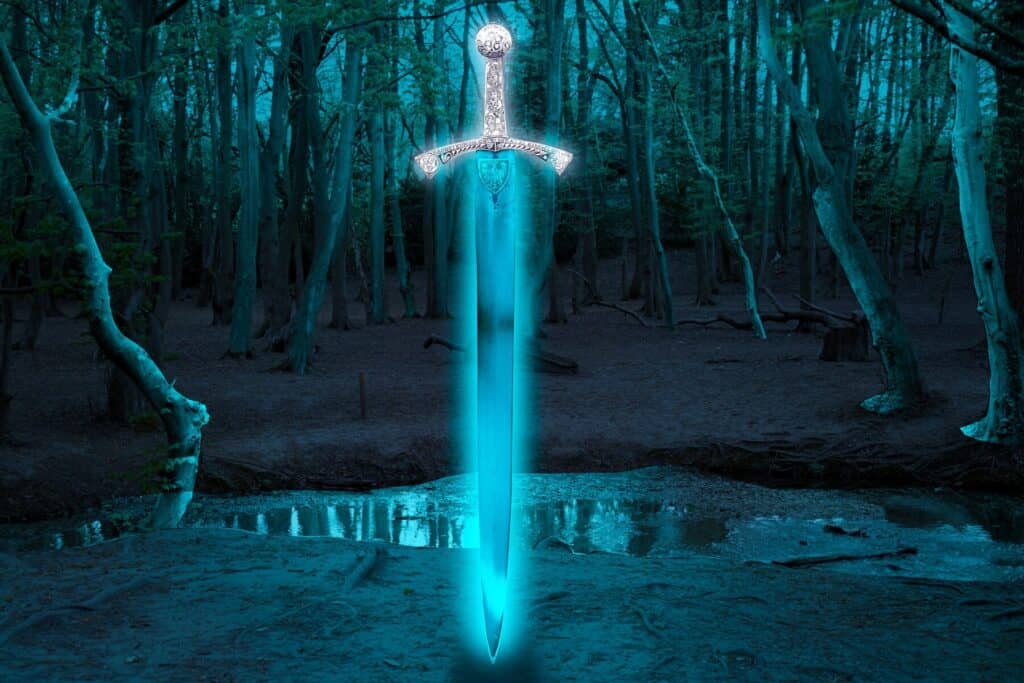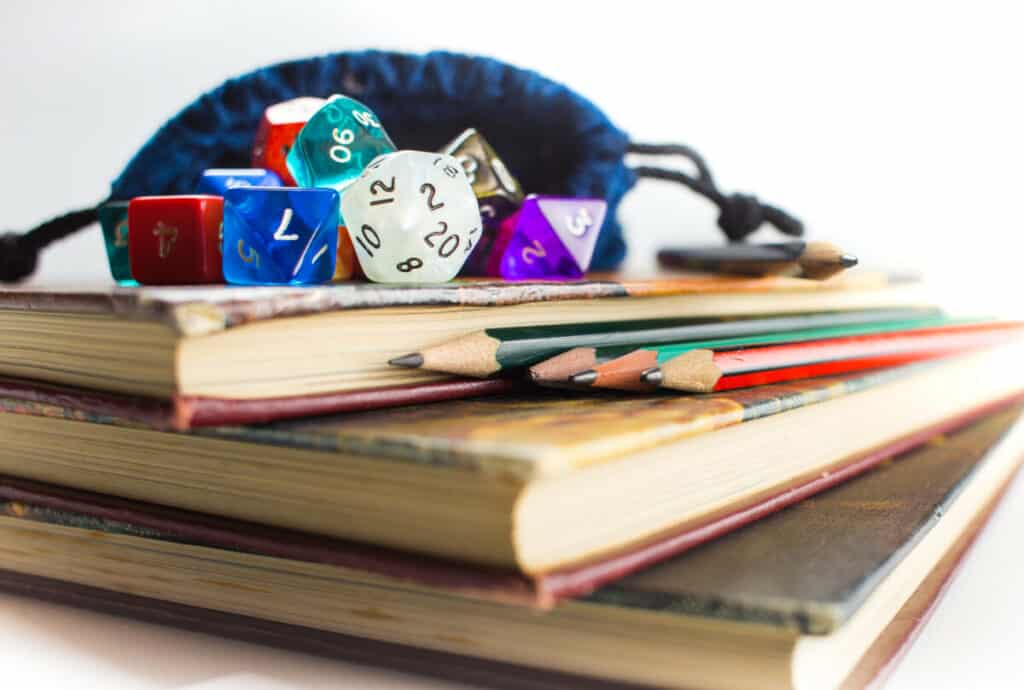Detect Magic is one of the most commonly prepared spells by players in the entirety of 5E Dungeons and Dragons. For the low price of a 1st level spell slot or 10 minutes of your time, you become a divining rod that can sense the presence of nearby magic for up to 10 minutes, and you can often learn more about its location and school of magic with a little focus.
Definitely useful, but doesn’t really tell you a lot of information about anything outside of magical traps or which pieces of loot are likely to be the most valuable or powerful.
That said, I can say that after many years of playing in 5th edition DnD campaigns, I almost never see this spell applied as written. Players and DMs both frequently attribute far more power and utility to this simple divination spell than is due, resulting in a ton of extra information being given out to the party.
So what does this oft misused spell actually do? Time to crack open the Player’s Handbook and check out the spell description.
DnD 5E Detect Magic Spell Description & Benefits
Detect Magic
The Player’s Handbook, p.231
1st level divination (ritual)
Casting Time: 1 action
Range: Self
Components: V, S
Duration: Concentration, up to 10 minutes
For the duration, you sense the presence of magic within 30 feet of you. If you sense magic in this way, you can use your action to see a faint aura around any visible creature or object in the area that bears magic, and you learn its school of magic, if any.
The spell can penetrate most barriers, but it is blocked by 1 foot of stone, 1 inch of common metal, a thin sheet of lead, or 3 feet of wood or dirt.

Benefit #1: You can sense the presence of nearby magic and focus to see the aura around visible creatures or objects.
This is the primary reason many players take Detect Magic as a spell, as a capable spellcaster can work with the party rogue to pick up on traps that might otherwise go unseen. The auras are also a nice touch, as they make it easy to separate different things that are triggering your magic sense.
With a range of 30 feet, it’s often easy to also move any known magic away to see if there is an unseen source of magic nearby, even if you can’t pick up on exactly where it is.
Benefit #2: Detect Magic works through many common dungeon barriers.
Stone and wood are common materials for dungeon walls and doors, meaning you can often pick out the positions of enemies in the next room just by focusing on where their magic items are. A clever DM can structure their dungeon crawls in such a way that robs you of this ability via long 5 foot wide hallways and metal doors, but many do not, which can give you a real edge.
While the thin sheet of lead isn’t an abundantly common problem you’ll run into from 5E (though clever or sadistic DMs can find lots of uses for this foil), I love that this running gag from 3rd edition carried over to 5th edition and laugh every time it comes up when I reread The Order of the Stick webcomic.
Benefit #3: Detect Magic is a ritual spell.
This is an especially big deal for artificers, bards, clerics, druids, and wizards, as they receive the ability to cast any spell they know with the ritual tag on their spell list as a ritual spell, and Detect Magic shows up on all of them. 10 minutes is a small price to pay for having access to another use of Magic Missile or Faerie Fire during a combat encounter later in the day.
If your party doesn’t have one of the above 5 classes in it, warlocks, despite not having this spell on their spell list, can often consistently reap the benefits of this useful spell without sacrificing much in their builds via either the Book of Secrets or Eldritch Sight, as can any character with the Ritual Caster feat.
What Does Detect Magic Detect?
So now that we know Detect Magic can detect the presence of magic within 30 feet and the auras of visible creatures or objects that bear magic (barring barriers made of specific materials), let’s take a moment to answer some common questions about what Detect Magic can pick up on.

Does Detect Magic See Invisibility?
Nope! While you can pick up on the presence of nearby magic if an invisible person or item is near you, since the invisible thing is, well, invisible, you can’t pick up on its aura, even by focusing. Spells like Faerie Fire, See Invisibility, and True Seeing are specifically designed for this task though, so pick one of those up if you want some easy foils to this common illusion.
Can Detect Magic Detect Illusions?
Like with Invisibility, Detect Magic cannot specifically detect illusions. You can sense magic is nearby when near an illusion, but since illusions aren’t people or objects, they won’t radiate an aura if you try to focus on them.
Can Detect Magic Identify Magic Items?
Not really. Detect Magic can tell you if an item is magical, but you often won’t get more information than that since magic items that aren’t affiliated with specific spells tend not to be affiliated with specific schools of magic in 5E. The Identify spell will provide that information though, and can give you additional details about the item to boot!
Does Detect Magic Detect Potions?
Yes! Any potion from common Potions of Healing to legendary Potions of Storm Giant Strength are considered magical, so Detect Magic can pick up on these items. Figuring out exactly what you’ve found is worth the use of an Identify spell though – especially since a Potion of Poison looks just like a Potion of Healing.
Does Detect Magic Detect Curses?
Alas, it does not. While pages 138-139 of the Dungeon Master’s Guide are pretty clear about this, Jeremy Crawford firmly closed the door on this possibility with Identify, which would be far better suited to this task than Detect Magic as discussed above.
Does Detect Magic Detect Mimics?
It does not. A mimic’s ability to polymorph is natural and nonmagical, unlike the Polymorph spell, so Detect Magic can’t pick up on it. Even if a mimic’s ability to change was somehow magical or done via the Polymorph spell, all you’d see is the transmutation aura around it with Detect Magic.
Figuring out what spells are specifically affecting a creature once again falls under the purview of Identify.
Can Detect Magic Detect Magical Creatures like Dragons?
Rules as written, no, and this is backed up by Jeremy Crawford. Detect Magic is intended for spells, unnatural effects that replicate the effect of a spell, and magic items. There is also further support from page 20 of this Sage Advice Compendium from 2017. In it, magic is defined in 2 ways:
- The background magic that is part of the D&D multiverse’s physics and the physiology of many D&D creatures
- The concentrated magical energy that is contained in a magic item or channeled to create a spell or other focused magical effect
The first category of magic applies to magic as a part of nature, which is not picked up on via Detect Magic, as with the Mimic example above. This is what rules out the ability to detect magical beasts, demons, devils, dragons, and any other highly magical being you come across in a Monster Manual.
The second category of magic in the Sage Advice Compendium asks you to look at a non-nature situation and ask the following questions:
- Is it a magic item?
- Is it a spell? Or does it let you create the effects of a spell that’s mentioned in its description?
- Is it a spell attack?
- Is it fueled by the use of spell slots?
- Does its description say it’s magical?
If the answer to any of these questions is yes, then Detect Magic applies. So for example, a dragon’s ability to transform in the Monster Manual would be considered magical, because the description of the ability says it does so magically. If there’s someone wandering around with an aura of transmutation around them, it’s probably worth being extra polite just in case.
A dragon’s breath weapon, on the other hand, would not be considered magical, as it is not described as a magical effect and does not correspond to a specific spell or spell mechanic. Best to just get out of the way if given the chance.

5E Classes That Can Learn the Detect Magic Spell
- Artificer
- Bard
- Cleric
- Druid
- Fighter (Eldritch Knight, at 3rd, 8th, 14th, or 20th level)
- Paladin
- Ranger
- Rogue (Arcane Trickster, at 3rd, 8th, 14th, or 20th level)
- Sorcerer
- Warlock (Eldritch Sight or Pact of the Tome + Book of Ancient Secrets)
- Wizard
Detect Magic is intended to be a very universally useful spell for many professions in the 5E world, including adventurers, researchers, merchants, and alchemists. This makes its wide accessibility at low levels completely understandable from a worldbuilding perspective, as the need to identify magic’s presence up close and at a distance is often a constant in daily life.
This creates a bit of an odd dichotomy with 5E’s overall design, however, as 5th edition has always tried to lessen the stranglehold magic has over its predecessors, and has, for better or worse, generally succeeded.
Magic items in particular are designed to be relatively rare and hard to move, to the point where the Dungeon Master’s Guide (page 135) says it is likely the market for magic items is going to resemble the market for fine art in the real world, complete with invitation-only auctions and the uncanny ability to attract thieves.
As if this disconnect between worldbuilding and system design wasn’t enough, most 5E campaigns I’ve played in tend to skew toward high magic environments. Those that didn’t ended up being extremes in the other direction, where magic was as rare, if not more so, than was intended.
Naturally, this confusion leaves us with a critical question that now needs to be answered.
Which 5E Classes Should Learn or Prepare the Detect Magic Spell?
Artificers, Bards, Clerics, Druids, and Wizards

All 5 of these classes receive access to ritual casting for ritual spells on their spell lists for free, meaning that as long as you have the room in your daily spell preparations to prepare Detect Magic, you should probably do so.
This is a paltry opportunity cost most of the time, especially if you’re in an environment where you can spare 10 minutes to avoid expending a spell slot to investigate something that doesn’t seem quite right. Regardless of the level of magic in your campaign setting, I’d always consider taking this spell as these classes.
It also goes without saying that if you take the Ritual Caster feat for access to ritual spells on the bard, cleric, druid, or wizard spell lists, everything I said here still applies.
Warlocks
If you’re take Pact of the Tome and the Book of Ancient Secrets invocation, everything I had to say above applies here. If not, you then have to decide whether taking Eldritch Sight is worth the use of an invocation, as Detect Magic is not on the warlock spell list.
Personally, I wouldn’t take Eldritch Sight over Agonizing Blast or Devil’s Sight, and I would never take it as part of a Pact of the Tome build. Beyond that, Eldritch Sight is a solid invocation for all but the lowest magic campaigns unless your party already has access to 2 or more other spellcasters with reliable access to Detect Magic.
5E characters that should always learn or consider the Detect Magic spell:
- Artificer
- Bard
- Cleric
- Druid
- Warlock
- Wizard
5E Classes Who Should Never Learn or Prepare the Detect Magic Spell
Arcane Tricksters, Eldritch Knights, Paladins, and Rangers
All 4 of these classes and archetypes not only receive fewer spell slots than full spellcasters, they also have far better things to do than squander their limited spells and concentration on a casting of Detect Magic.
First, Detect Magic takes 2 actions to set up the ability to see auras and pick out spell schools, which is atrocious action economy when you’re in combat initiative and need to be doing what these classes all excel in – attacking.
Second, a Ranger is going to be leading their first round of combat with Hunter’s Mark, and a Paladin is going to be winding up for either a smite spell or a use of their Divine Smite ability – if not both. At low levels, that’s a sizable percentage of their available spells, and at higher levels, you’re still going to be doing these things most of the time.
In that same vein, Eldritch Knights have an attack pattern that is designed for them to spend their spell slots on combat spells, and Arcane Tricksters, due to their inability to wield shields or wear heavy armor, need to use their spell slots on defensive spells much of the time if they’re expecting a fight.
Finally, Arcane Tricksters, Eldritch Knights, and Rangers have the lowest number of known spells in the game – and the first two can only pick up Detect Magic at specific levels due to the school restrictions imposed on them when selecting spells.
This makes the opportunity cost for learning Detect Magic incredibly high for all of them, so despite Detect Magic’s usefulness, it’s almost always incorrect for you to learn this spell if there’s anybody else who can in the party.
Sorcerers
Possibly a controversial take, but sorcerers walk the middle of the road when it comes to whether they should take Detect Magic. As a full spellcaster, they have a lot of spell slots they can access should the need arise for someone to check for magic in the area. As a result, they’re far better suited to take this spell than any of the 4 classes/archetypes above.
On the other hand, sorcerers can only learn a finite number of spells, and are generally going to want access to spells that have more impact in initiative or in conjunction with their metamagic. Detect Magic interacts with neither of these situations well, which can leave it feeling like a wasted pick.
My personal inclination is to not take Detect Magic as a sorcerer unless you absolutely have to, but as a class that interacts heavily with magic, I would be more sympathetic to those who do.
Characters with feats that grant access to 1st level spells
Outside of Ritual Caster, I wouldn’t spend a spell learned through feats like Fey Touched or Artificer Initiate on Detect Magic unless literally nobody else in your party has access to this spell. So many classes can more easily pick this spell up with virtually no opportunity cost, and most of them are popular enough to ensure at least one is in your party at all times.
5E characters who cannot or should not learn or prepare the Detect Magic Spell:
- Barbarian
- Fighter
- Monk
- Paladin
- Ranger
- Rogue
- Sorcerer
Is the 5E Detect Magic Spell Worth It?
Generally, yes – but with caveats. Detect Magic’s usefulness is measured by 3 very different sliding scales:
- How much magic you’re expected to run into within the world of your campaign
- How much information your DM is willing to give you when you use it
- The opportunity cost associated with learning or preparing the spell

This means that in a high magic world or with a DM who is willing to do everything in their power to give you a spell school for magic effects that might not have anything officially provided in the rules as written, Detect Magic can be a great way to assess a location, person, or item before deciding on a course of action for addressing them.
Since several D&D classes can also effectively learn or access the spell for free, even low magic environments that play by the book won’t really hamper a lot of players who elect to pick up the Detect Magic spell.
Despite these upsides, there’s a very real problem with Detect Magic – it doesn’t actually come right out and tell you what sort of magic you’re dealing with, especially if you can’t see the person or object in question.
Sure, you can make some informed, educated guesses a lot of the time, but more often than not, Detect Magic ends up being a litmus test for whether you should be using a spell like Identify or Legend Lore. That isn’t exactly a glowing review, no matter which way you look at this 1st level spell.
Fortunately, you only really need one person in the party to have the Detect Magic spell for it to achieve peak usefulness in a campaign, and it is a good supplemental spell for those who want to look out for magical traps or secrets a crafty DM might sprinkle into a dungeon crawl.
That said, Detect Magic just doesn’t provide enough information to justify the staple status many players believe this spell has.
Other DnD Articles You Might Enjoy
- 5E Half Casters
- Ritual Caster 5E
- Fey Touched 5E
- Artificer Initiate 5E
- Best Druid Feats 5E
- Best Warlock Feats 5E
Braden is a founder of Assorted Meeples and has been a gamer & writer with a vivid imagination all his life. Don’t believe us? Check out his excitement when meeting Goosebumps author R.L. Stine as a kid! An avid Magic: The Gathering spellslinger for over 15 years, you can always convince him to shuffle up for a game (or three!) of Commander.
